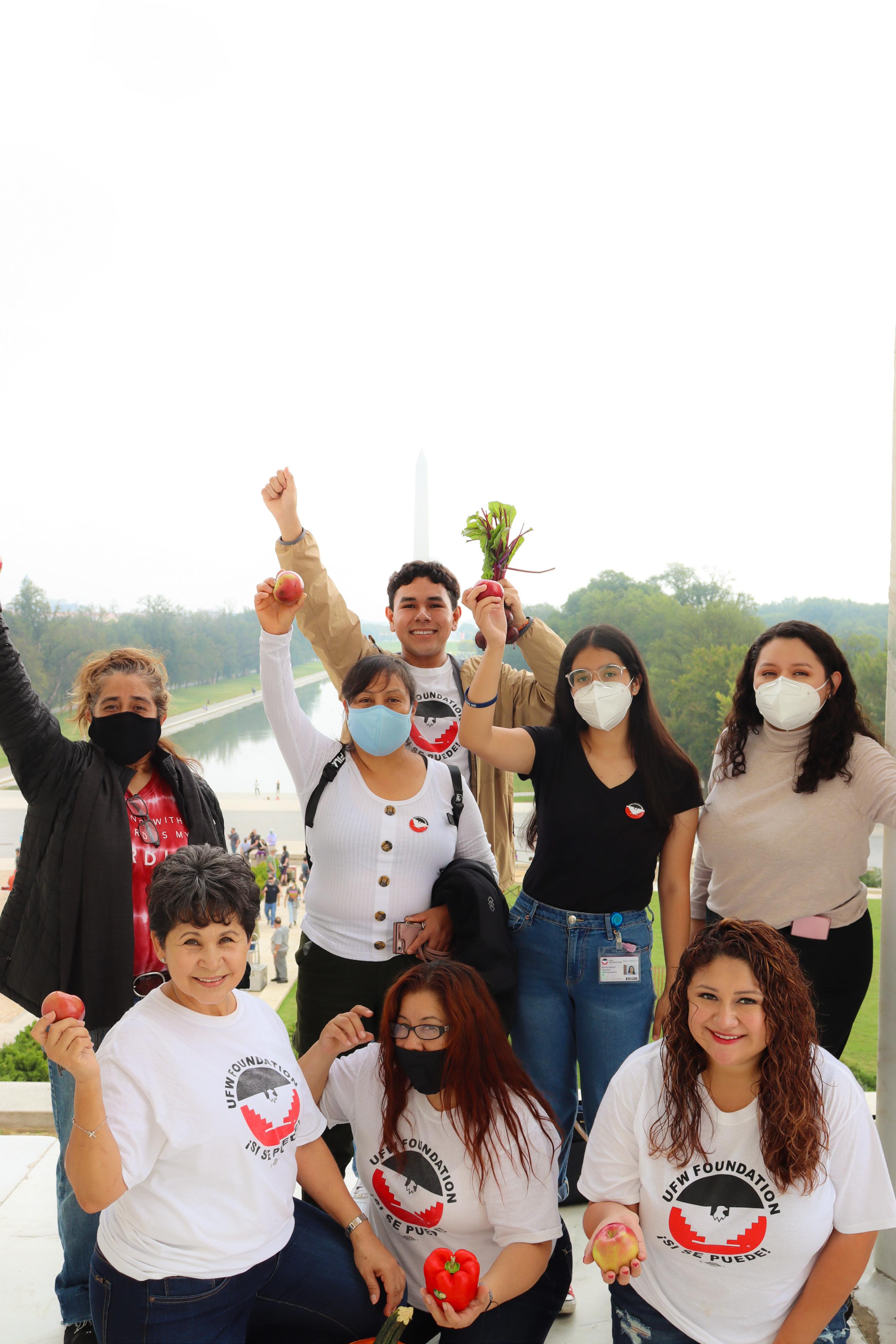Empowering Communities To Ensure Human Dignity.

2020–2022 IMPACT REPORT



2020–2022 IMPACT REPORT

2003
Board approves a broader mission and changes the name of a nonprofit 501(c)(3) established in 1971 to UFW Foundation.
2006
UFW Foundation becomes operational.
2007
UFW Foundation establishes the Citrus Freeze Disaster Relief Program in the Central Valley in California distributing food to 20,033 individuals and advocates for $1.75 million in emergency funding and a federal disaster declaration. These actions provide unemployment insurance, USDA food commodities, and the passage of SB 524, appropriating $16 million in relief for farm workers who lost employment due to the freeze.
2009
Awarded Office of Legal Access Program (OLAP) Recognition/Accreditation and begins providing direct immigration legal services, greatly expanding access to in-demand legal representation.
2012
UFW Foundation expands to provide Deferred Action for Childhood Arrivals (DACA) applicants with legal assistance.
2015
Along with the United Farm Workers (UFW) labor union, UFW Foundation settled a lawsuit with the state of California resulting in stronger heat regulations that protect farm workers and other outdoor workers from heat illness.
2016
In partnership with the UFW labor union, UFW Foundation helps secure overtime pay for California farm workers and advocates to extend these protections nationwide.
2021
Made instrumental gains on advocacy in support of immigration reform, particularly the passage of the Farm Workforce Modernization Act in the U.S. House of Representatives.
2021
UFW Foundation advocates for and achieves a historic $655 million pandemic relief allocation through the U.S. Department of Agriculture (USDA). This critically important nationwide allotment will provide a minimum of $600 per eligible farm worker, regardless of immigration status, who faced financial hardship as a result of the pandemic.
2021
Won a major lawsuit against the Trump Administration Department of Labor, preventing H-2A agricultural guest workers’ wage cuts totaling $1.6 billion over 10 years.
2022
Secures a USDA Farm and Food Worker Relief Program $97 million grant to deliver disaster relief payments to farm workers nationwide.
2022
In partnership with the UFW labor union, UFW Foundation leads a delegation of farm workers to the California state capital—in a march spanning 355 miles and 24 days—and gains passage of Assembly Bill 2183, which makes it easier for farm workers to unionize.
2022
Builds public understanding regarding the benefits of a just pathway to citizenship for farm workers and helps fashion a revamped version of the Farm Workforce Modernization Act in the form of the Affordable and Secure Food Act in the U.S. Senate.
20202022
Delivers $23 million in emergency assistance payments, over 247,825 meals, 147,620 emergency food boxes, 6,447 food cash cards totaling $359,700 and over 2.8 million face masks/protective equipment to farm workers and their families in need; provides public health education re COVID prevention, and helps deliver 40,307 vaccinations to prevent the spread of COVID among farm worker communities.
20202022
Uplifts farm workers in the media with over 463 media hits including coverage in Mother Jones, LA Times, USA Today, US News and World Report, Al Jazeera, Rolling Stone Magazine, and many other publications.
DIANA TELLEFSON TORRES Chief Executive Officer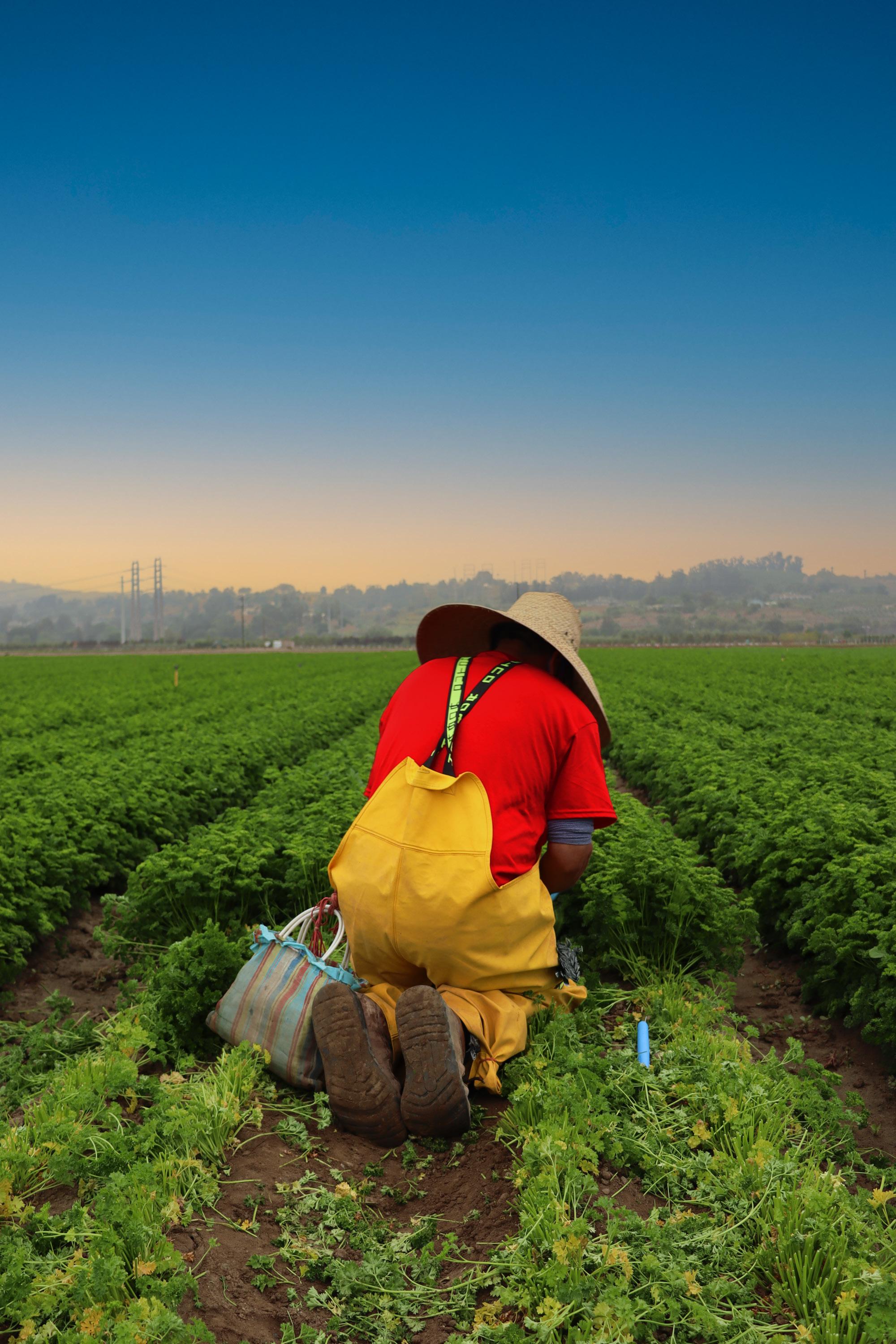
Farm workers are always essential.
We reach out to you with our inaugural Impact Report, having experienced and responded to a historic moment in time with record assistance and advocacy. What has been accomplished—and the momentum it has set forth—deserves being shared and recognized broadly. We also wish to thank all who have supported us—individual donors, our members, foundations, government agencies, stakeholders—for fueling the entirety of our work and these important outcomes.
Since the onset of the pandemic in 2020 and beyond, the UFW Foundation responded to the enormous need for health, financial, and economic assistance among farm worker and low-income worker communities.

$23 Million
Chief Executive Officer Diana Tellefson Torres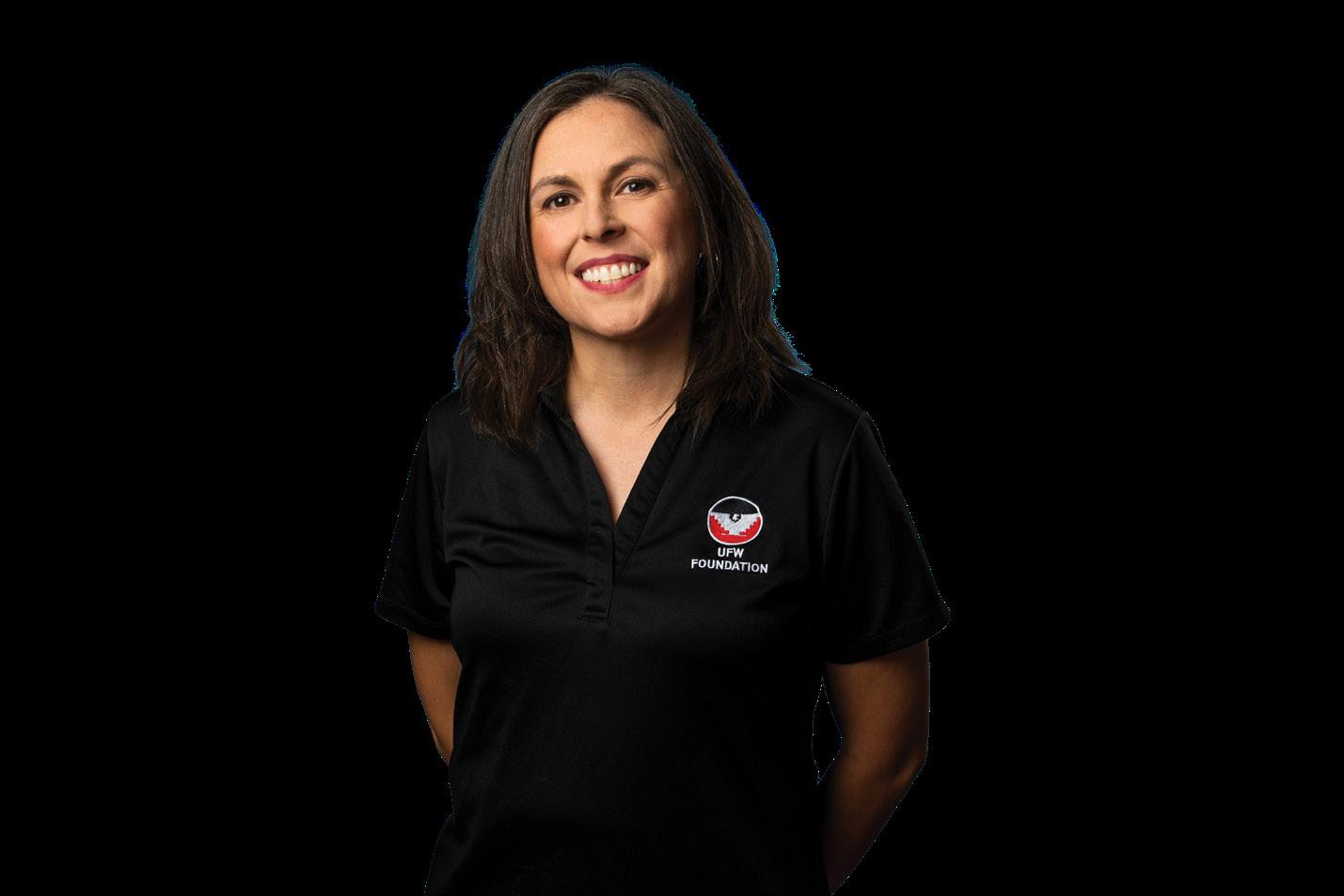
Beyond direct assistance, we were called to advocate and act on issues of concern at the national level. Farm workers support the US economy and are responsible for keeping people across the country and the world fed. Accordingly we:
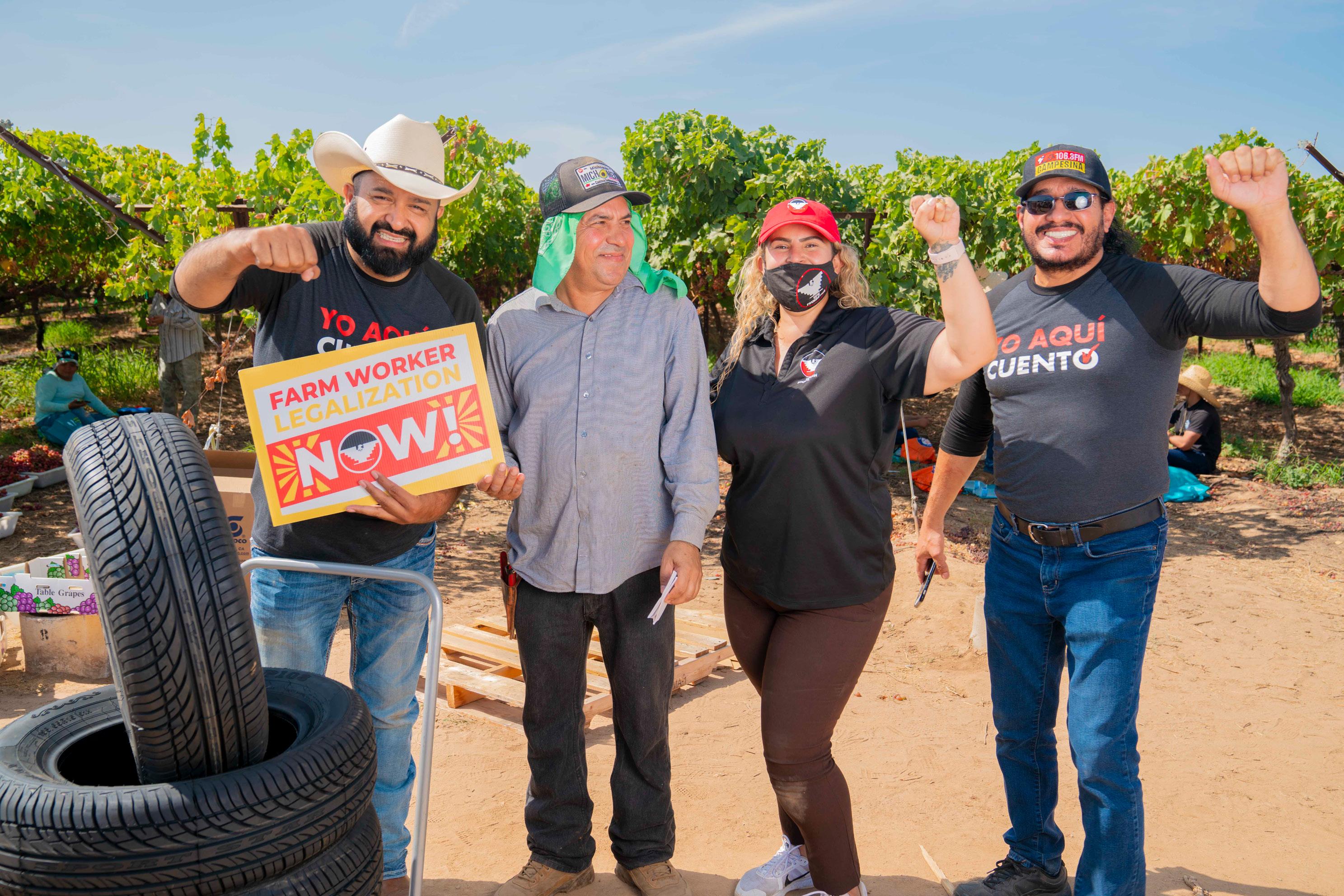
Provided public health education and interventions in California. On-the-ground organizing and advocacy efforts in Georgia, Michigan, Washington and Arizona.
Advocated for the establishment of a historic U.S. Department of Agriculture $655MM financial assistance allotment for farm and food workers negatively affected by the pandemic.

Secured a $97.8MM USDA grant to administer this assistance nationwide, in coordination with several other organizations, to provide $600 to each eligible farm/food worker.
Advocated for an equitable pathway to legalization for farm workers through the successful passage of the Farm Workforce Modernization Act in the US House of Representatives in 2021 and the introduction of the Affordable and Secure Food Act Senate version in 2022.
Mobilized a coalition of labor, immigrant, and human rights organizations and urged the Biden Administration to conduct a thorough investigation of the H-2A guest worker program after the exposure of human trafficking, slavery, and money laundering abuses in the Georgia Blooming Onion case.
With so much commanding our attention and action, UFW Foundation expanded its reach and witnessed much growth. Our work became more relevant than ever with a greater focus post-COVID on the lives and contributions of farm workers—essential workers who feed the country. We broadened our on-the-ground organizing and advocacy work to Michigan, Georgia, Washington, and Arizona, all states with a sizeable farm worker presence and a largely overlooked calling to stand up for farm worker rights. Going forward, we will continue to grow and strengthen our advocacy on a national level. We are also thrilled about our progress with the development and deployment of our Farm Worker Technology Initiative, a transformative, systems-building undertaking to advance equity via technology.
We invite you to explore our Impact Report for more information on all that your support has actualized and all that it promises to bring forth in the future.
Diana Tellefson Torres Chief Executive Officer

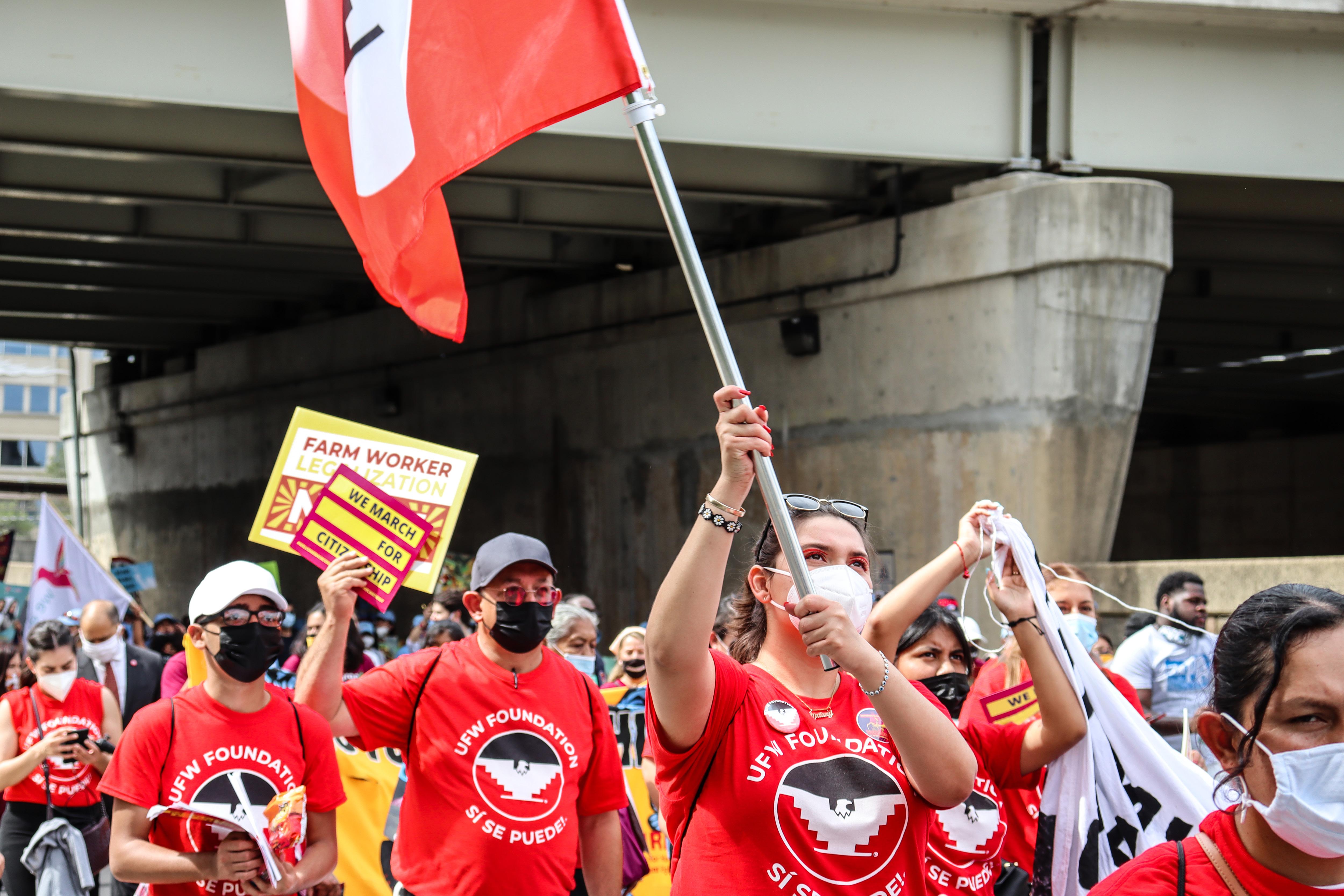

Education & Outreach
Workers’ Rights Services
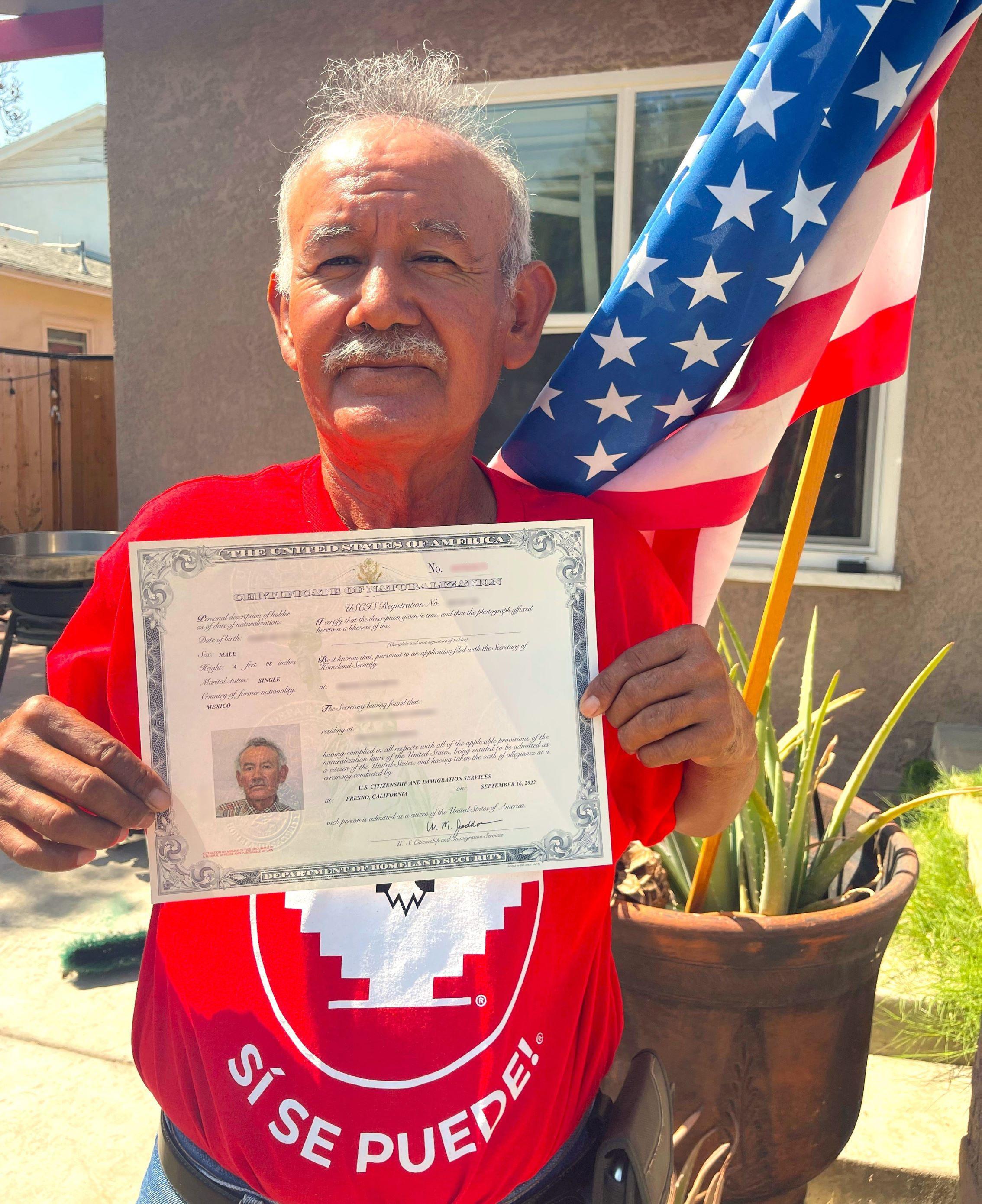
Emergency Relief Services

Community Advancement and Outreach Services provide support in the immediate and intermediate term, strengthen, and empower.
Almost 86% of farm workers in the U.S. are foreign born and approximately 45% are undocumented (Center for Migration Studies, 2022). Significant numbers have to navigate temporary and undocumented states of legal status.
In addition, farm workers often have different legal status than their children and these varied statuses affect what services and supports each can access and the spaces that they move in without fear. Many have the ability to apply for legal adjustment programs that afford them greater access to work, employment, education, and advancement opportunities and with greater peace of mind.
Immigrants and farm workers need access to immigration legal services to allow them to work toward greater social, economic, and civic integration and engagement.
Immigration Legal Services: Providing immigration legal services centers is at the origins of this organization’s establishment. We began providing immigration legal services in 2008 with the oversight of an attorney and have been approved and accredited to provide these services by the Office of Legal Assistance Programs since 2009. This accreditation—only afforded to non-profit, federally tax-exempt non-profit organizations—ensures the availability of competent immigration legal representation for low-income/indigent persons. It also recognizes that our lawyers and accredited representatives have the proper training and experience to represent and advocate for our legal services clients.
Today, immigration legal services range from DACA Renewals, to Naturalization, to Adjustment, as well as Political Asylum, Deportation Defense/Relief, VAWA Petitions, U Visas and Special Immigrant Juvenile Visas (SIJC) petitions. Our immigration legal services encompass a broad range of legal protections available to farm workers and immigrant workers and their family members. UFW Foundation has become one of the largest providers of immigration legal services in rural California.
Deferred Action for Childhood Arrivals (DACA) Applications/Renewals
381
Naturalization Applications
$195,215
Total Fee Savings
262 Full Fee Waivers
Submitted
$189,950 in fee savings
13 Partial Fee Waivers Submitted
$5,265 in fee savings
518
Other Immigration Law Remedies—Family Petitions, Waivers, U Visa, Special Immigrant Juvenile Visas, etc.
67
844 Removal Defense Cases for Adults
1,921
Immigration Legal Consultations
489
Individuals Assisted with DACA Renewal/Naturalization Filing Fee, Making the Immigration Legal Remedy Accessible
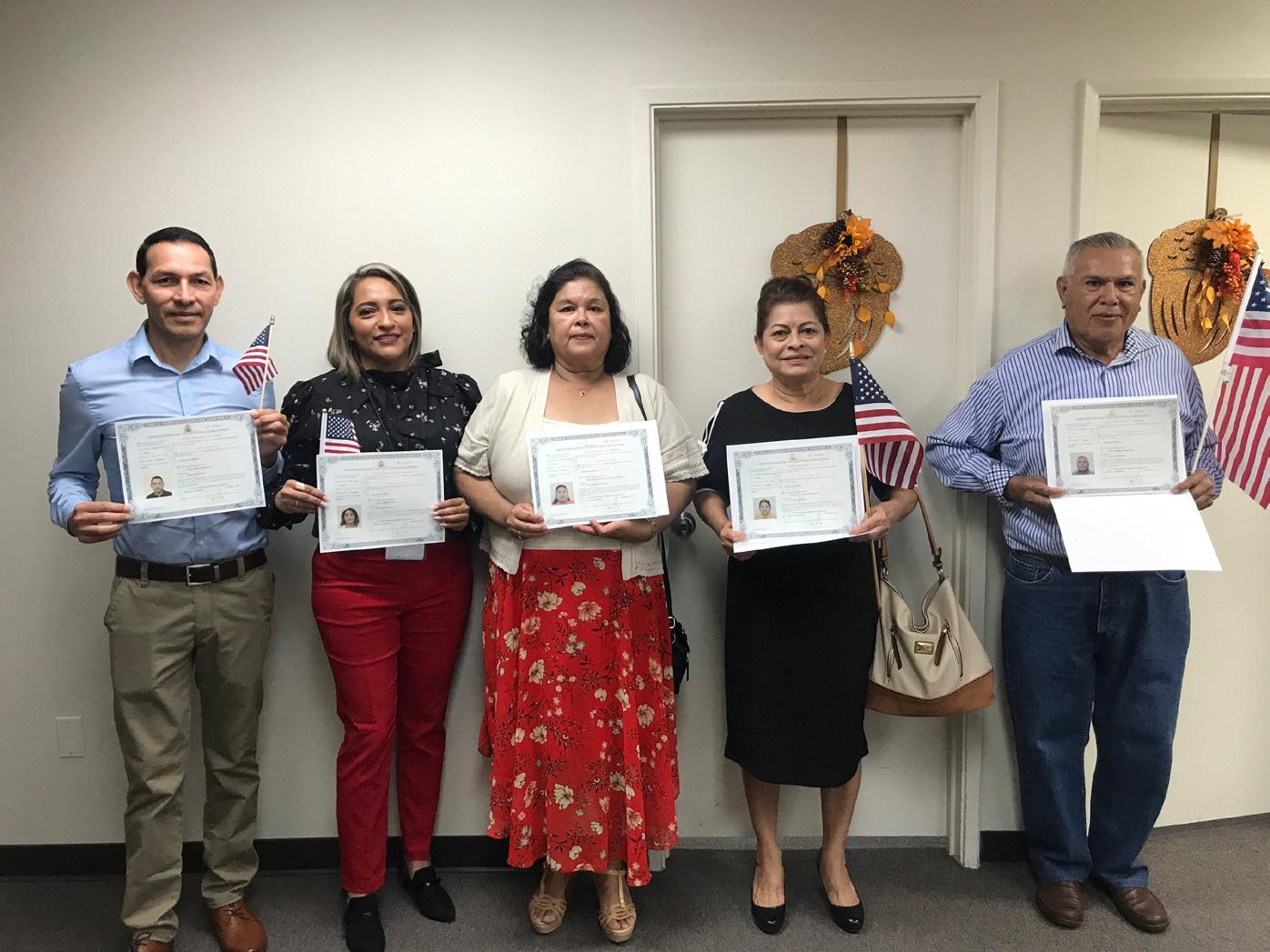
460
DACA Cases Afforded Filing Fee Assistance
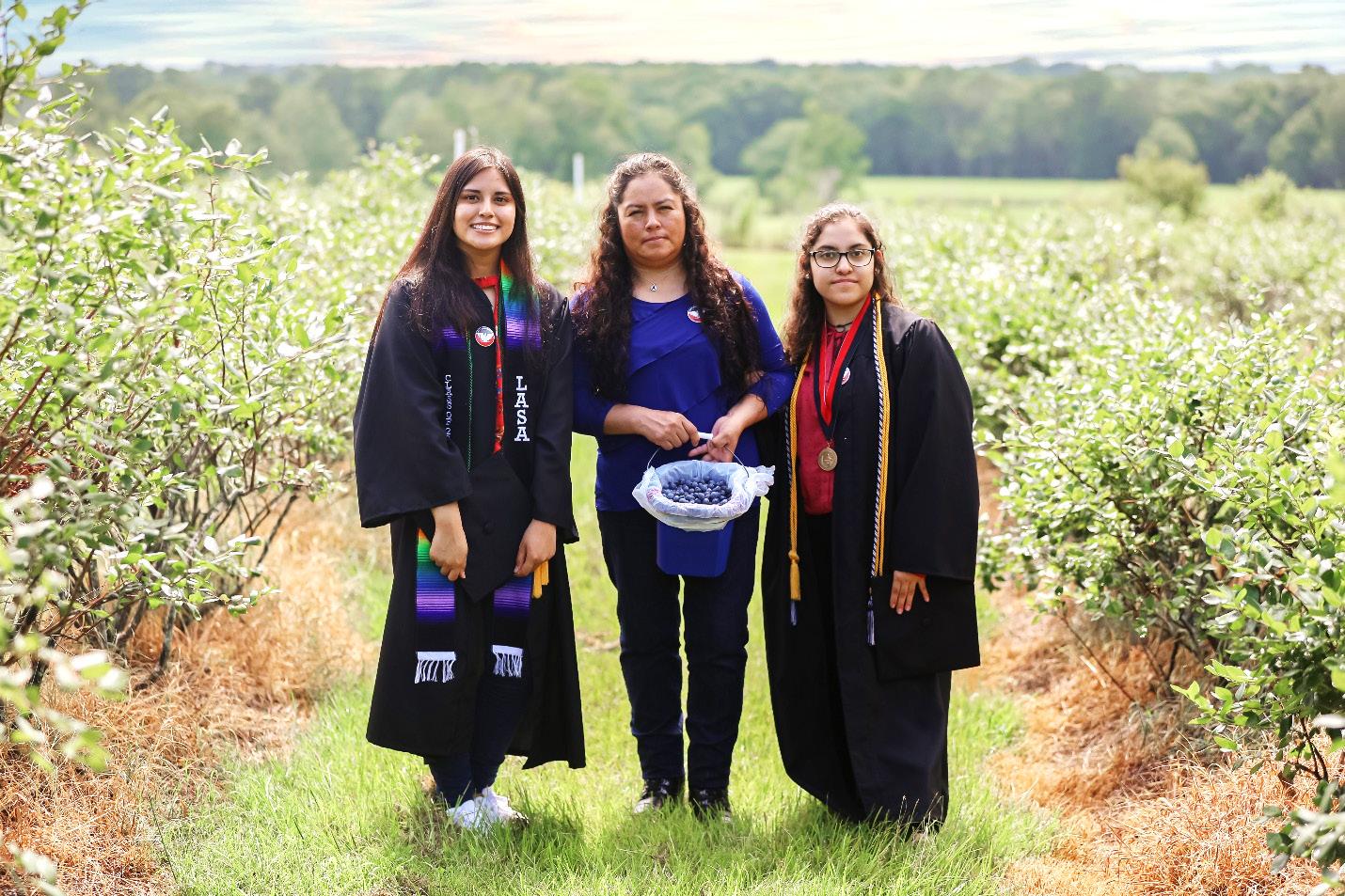
$227,000 in Savings
29
Naturalization Cases Received Fee Assistance
$21,025 in Savings
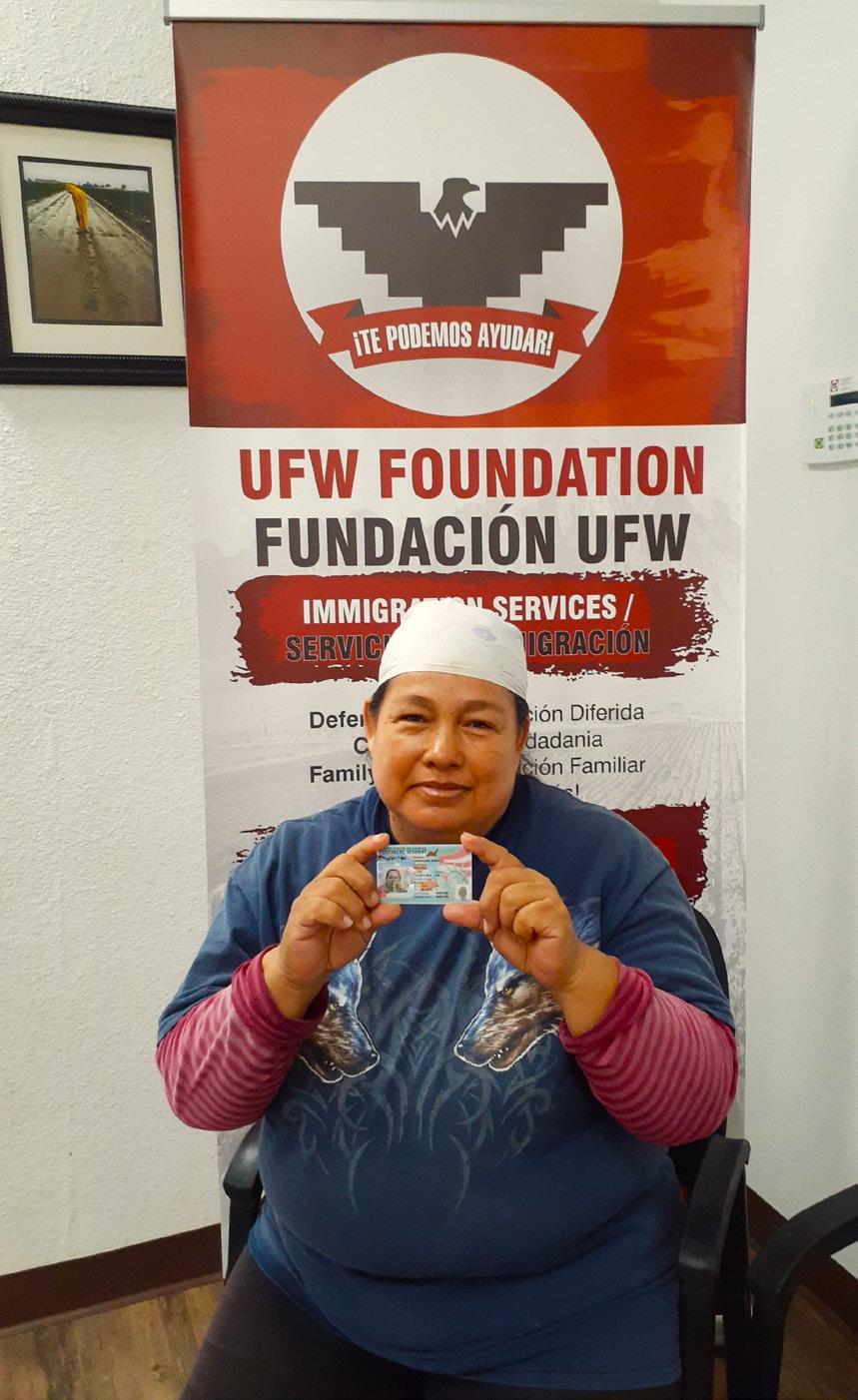
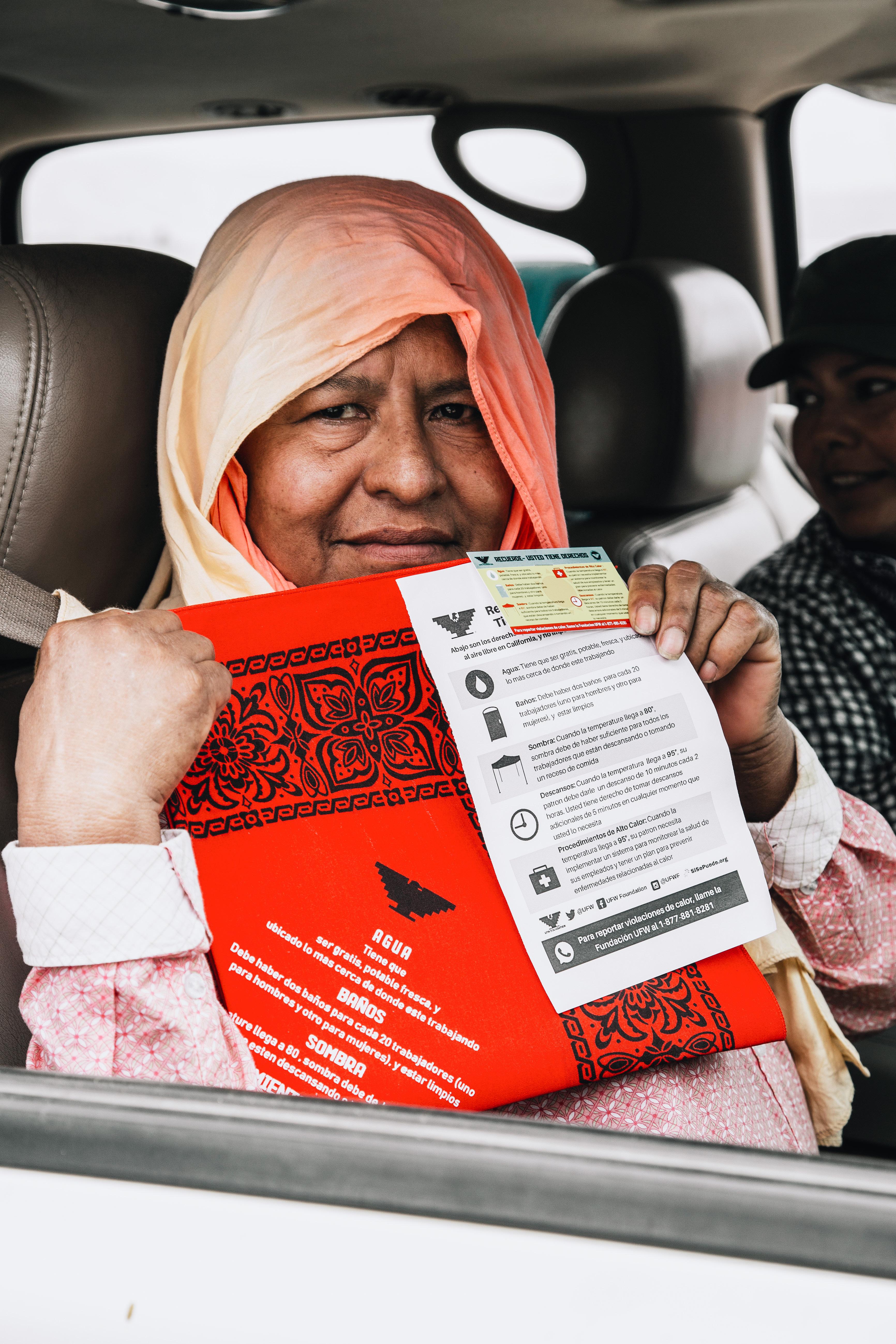

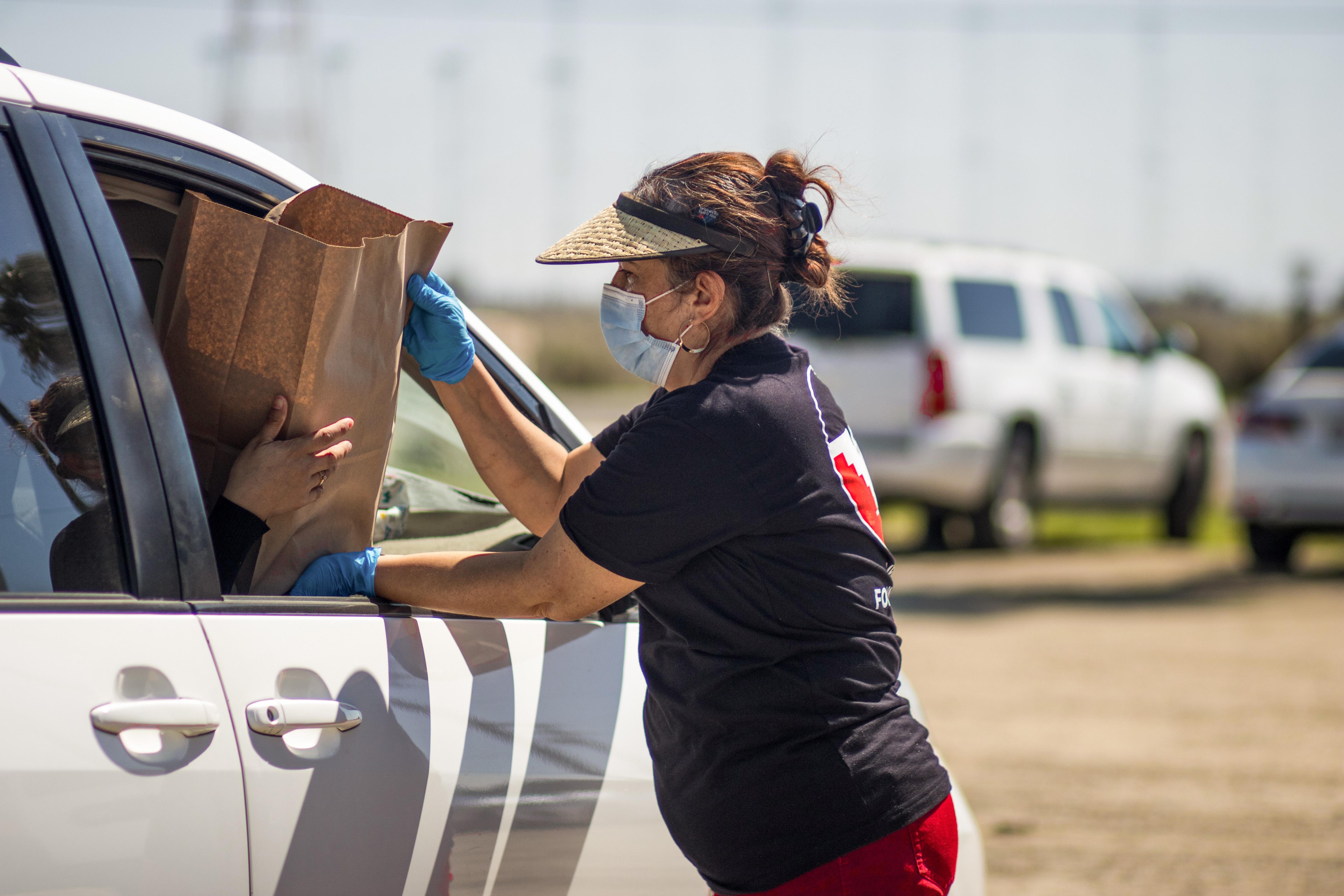
UFW Foundation also conducts a Community Colleges Program that provides immigration legal consultation and assistance to students with immigration-related needs. In 2022, we provided the following supports:
1,000 ASSISTED:
Students, staff or faculty with immigration legal information and services.
16 SUPPORTED:
Campuses by providing critical consultation and assistance to students, staff and faculty.
Getting access to information that is directly relevant and accessible—in format, content and language—is critical for immigrants and farm workers. Research indicates that clear public information from trusted sources is key to ensuring that immigrant communities are connected and well-informed about matters that impact their day-to-day well-being.
Education & Outreach: Offer Information and Workshops to respond to legal, labor, health, and related housing and social service needs.
43,306
Served through a range of Information Sessions, Door-to-Door Outreach, Trainings, Webinars, Community Meetings, and Events.


Workers’ Rights: UFW Foundation provided services and support for farm workers who faced possible violations of their labor rights.
521
FARM WORKERS SERVED
Farm worker cases were provided with intake, consultation, and referrals for services for labor violations from 2020-2022 that included wage theft, harassment, retaliation, worker’s compensation violations, heat violations, meal and break violations, failure to provide sick pay and more.
In times of emergency and distress, low-income immigrant communities need a trusted source of support, offered in a native language and in a culturally familiar context. They also need assurances that simply having been in need and drawing upon assistance will not penalize or prevent them from participating in public programs and immigration adjustments in the future.
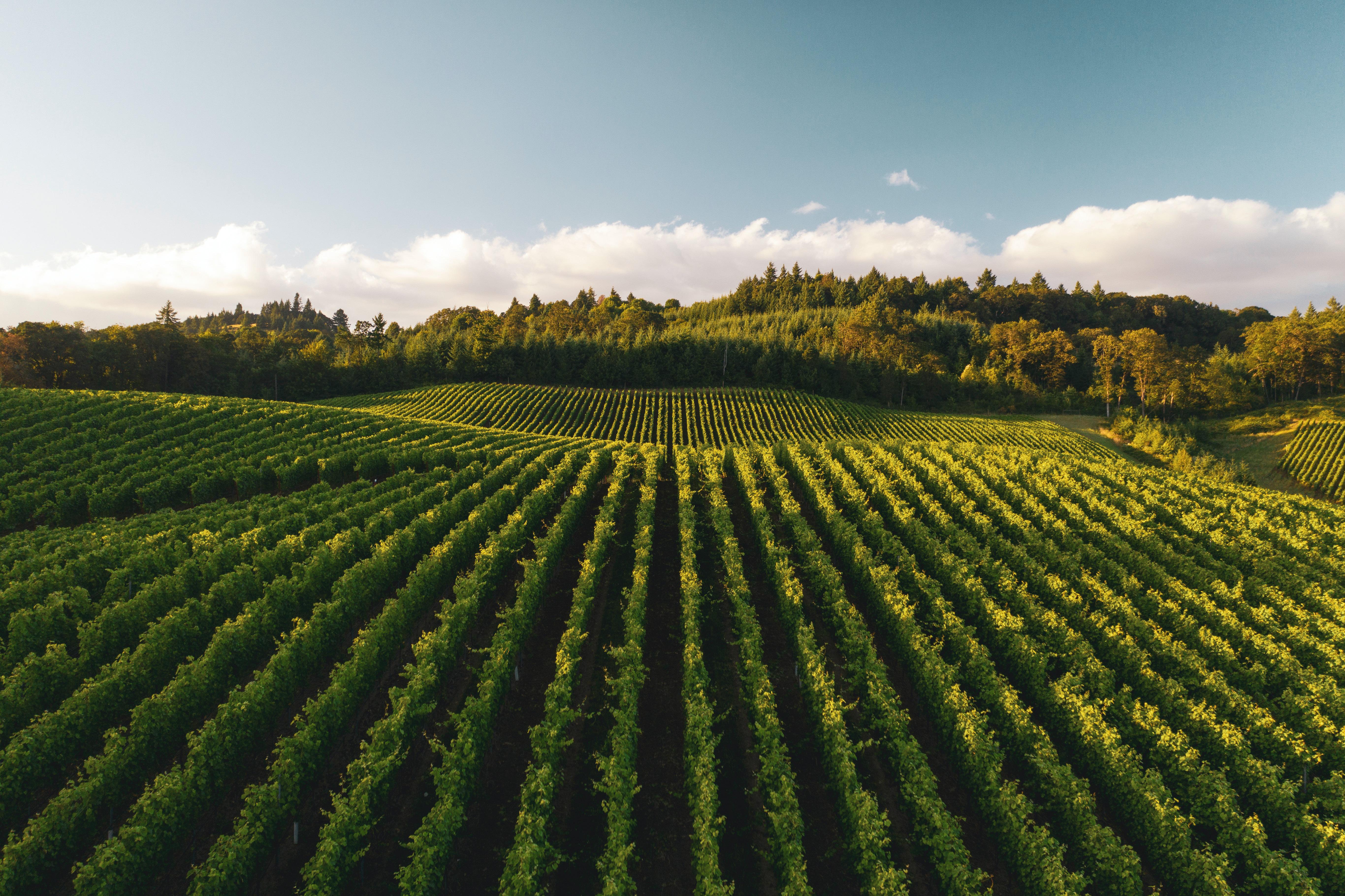
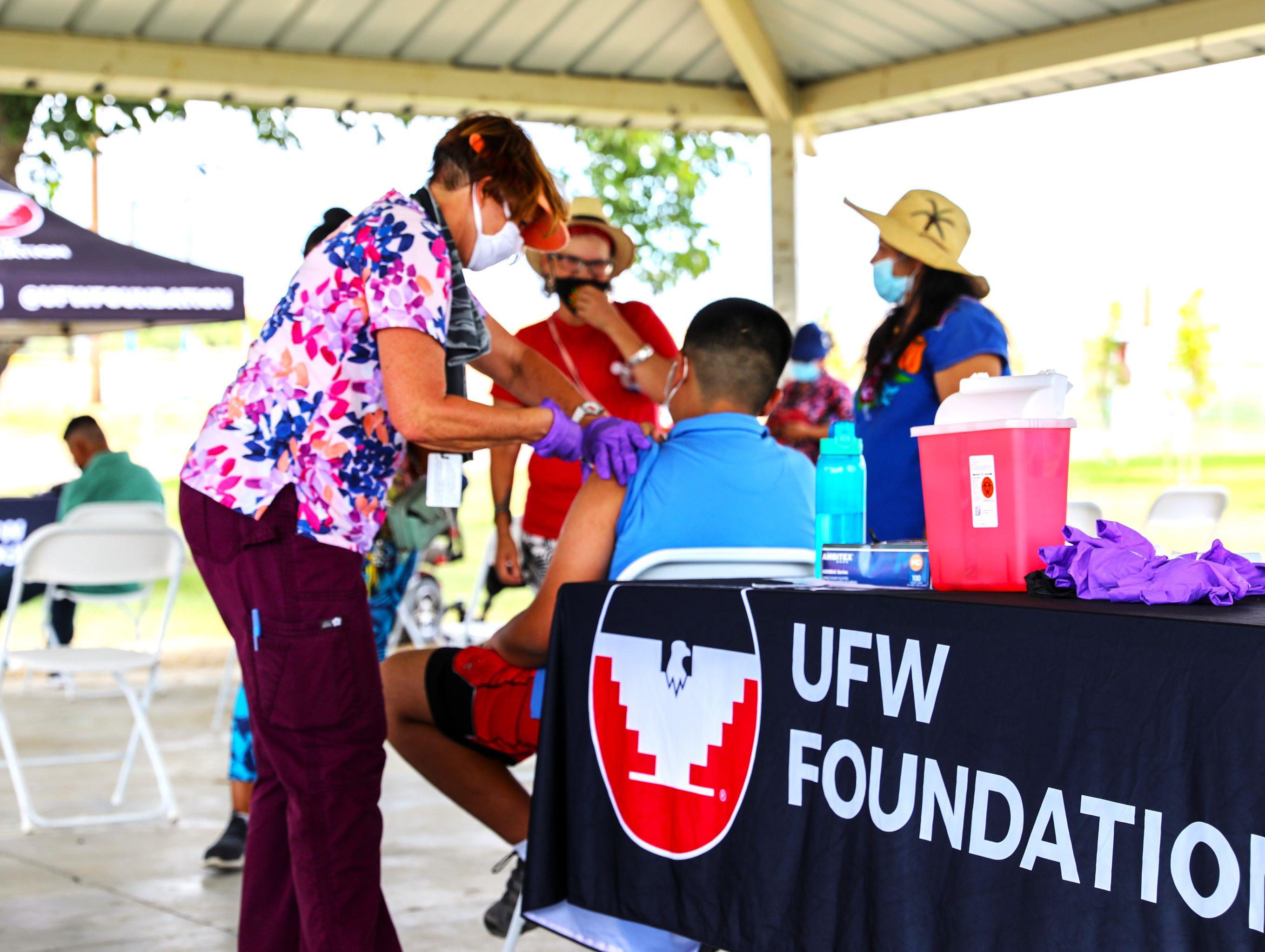
Systemic Change encompasses the organization’s efforts to make meaningful progress toward social justice. Our Systemic Change department seeks to improve the lives of farm workers, immigrants and Latinos through legislative advocacy, community outreach and education, organizing campaigns, and leadership development efforts that help actualize just and equitable practices, policies, and institutions.
UFW Foundation is firmly focused on advocacy, recognizing it as a path to systems-level progress.
Advocacy and public education with farm workers and low-income immigrants
Know Your Rights Education
Civic Education, Leadership Development, and Engagement efforts with farm workers and farm worker communities
Voter Education on Key Issues and Policy Matters
Voter Registration
Developing and Championing Just and Equitable Policies
INFORMING POLICY AND PRACTICE
Policymaker Education
Farm Worker Testimonials
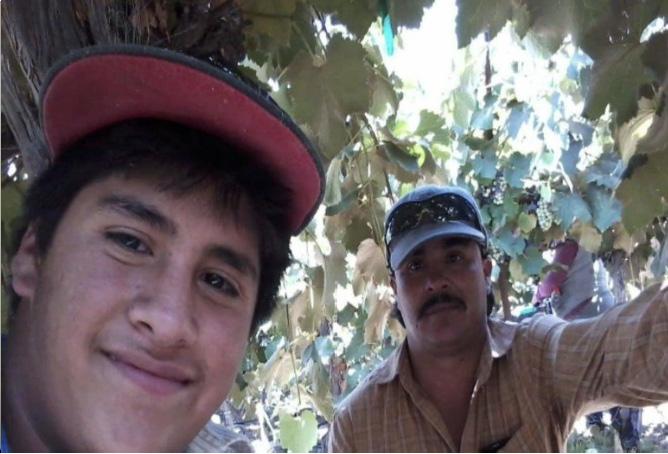
Informing Legislators and Stakeholders on Key Issues and Public Policy
Informing Federal and State Regulations
Informing Training and Education Across Public Spaces and Professions
Vicente Reyes, a 20-year-old farm worker and college student, provides testimony in the House Judiciary Subcommittee Hearing on Immigration and Citizenship (September 23, 2020) entitled “Immigrants as Essential Workers.” Here he calls for prioritizing farm workers for vaccinations given their role as essential workers who feed the country in the midst of a pandemic.

ORGANIZING CAMPAIGNS
A Day in the Life of a Farm Worker
View Twitter Post
Watch Tik Tok Video
View Facebook Post
Heat Awareness
#HotFarmWorkerSummer
View Facebook Post
View Instagram Post
Immigration Reform and Farm Worker
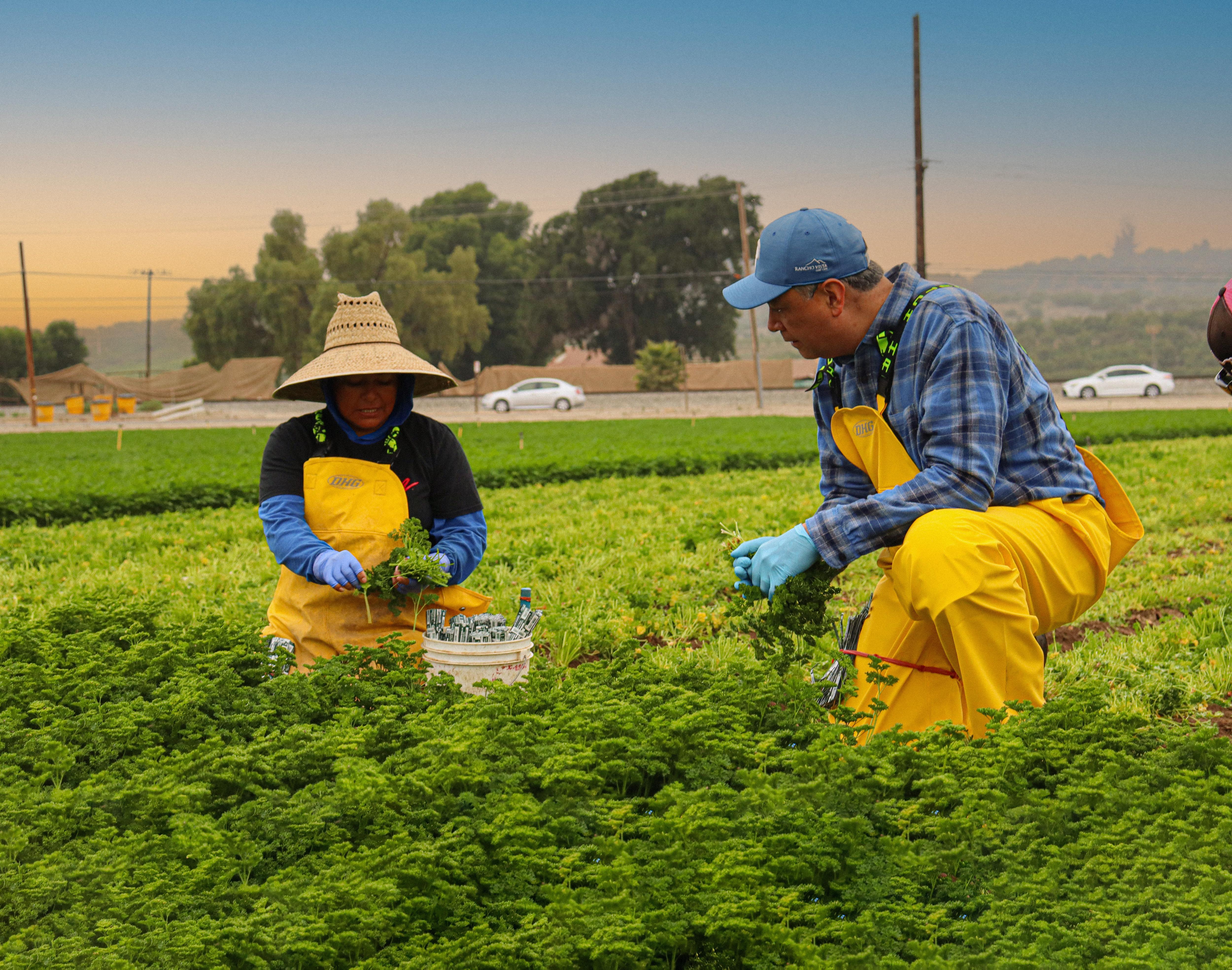
Modernization Act Advocacy
View Facebook Post
View Facebook Post
View Instagram Post
View Instagram Post
Climate Change
View Instagram Post
View Instagram Post
View Instagram Post
Take Our Jobs
View Twitter Post
View Twitter Post
Farm Worker Advocacy Trip to Washington, D.C.
Watch Tik Tok Video
Farm and Food Worker Relief
View Facebook Post
US Senator Alex Padilla picks radishes in Oxnard, CA – he was the first Senator to rise to our Take Our Jobs challenge.Advocacy and systemic change actions dedicated to just and equitable economic, political and social systems are necessary to create conditions in which all can actualize and contribute fully, as fundamental matters of human rights and justice. We recognize that our efforts in public spaces—in raising awareness, educating the public, and shaping legislation—all promise greater impact on greater numbers of people and help create more just and equitable policies and practices.
In 2022, much of our effort focused on immigration reform—largely via the Farm Workforce Modernization Act—and around labor, heat standards/protection, pesticide protection, and climate resiliency-related policies and regulations affecting farm workers.
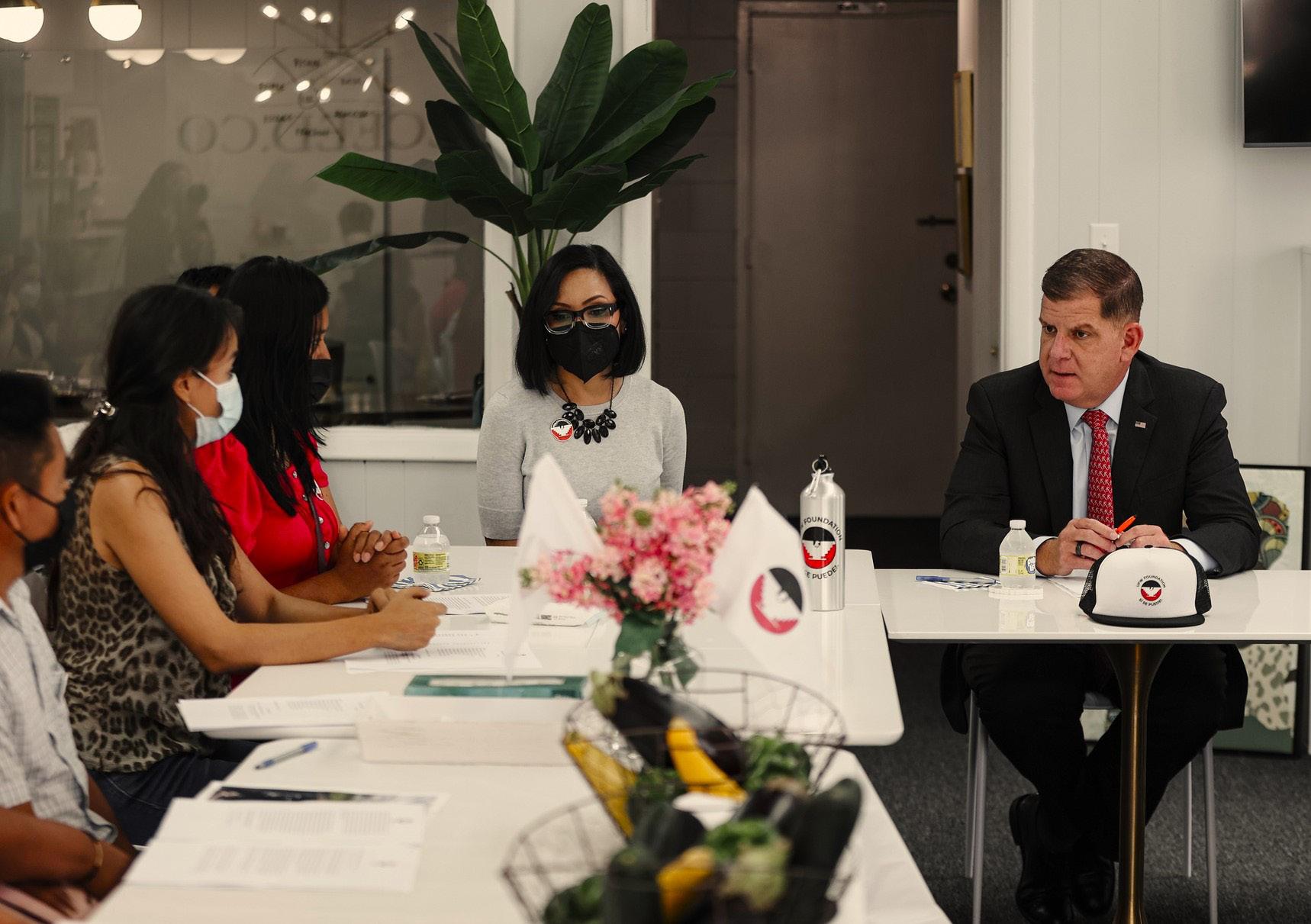
 UFW Foundation Georgia farm worker members meet with former US Secretary of Labor, Marty Walsh.
UFW Foundation Georgia farm worker members meet with former US Secretary of Labor, Marty Walsh.
REACHED AND ENGAGED
100,000
Farm workers in immigration reform events that included outreach to migrant farm worker camps; information sessions at local churches, colleges /universities, community events, house meetings; and legislative visits, call campaigns, and related advocacy actions.
During November and December 2022, UFW Foundation led multiple advocacy visits to Washington, D.C. to advocate for the Farm Workforce Modernization Act. This resulted in the introduction of the Affordable and Secure Food Act, the Senate version of the original legislation. While our efforts to gain passage were eventually stalled by Senate Republican leadership, we did make significant gains in public education and support building and were able to prevent Title 42 and other misguided border enforcement from being included in the Omnibus bill.
As part of a nationwide We Are Home immigration coalition campaign, UFW Foundation conducted virtual advocacy visits with key U.S. Senators to push for an equitable path toward farm worker citizenship to be included in the must-pass Omnibus federal spending bill.
Petitioned for federal level emergency heat rules and more immediate state protections, aligned with federal standards, to protect workers from heat illness and death.
Called for federal level pesticide protections with the passage of the Ban
All Neurotoxic Organophosphate Pesticides
From Our Food Act (H.R. 8765), introduced by Rep. Nydia Velazquez (D-NY) in August 2022.
Advocated for the passage of federal level overtime protections for all farm workers through the Fairness for Farmworkers Act of 2022. Currently, California is the only state that provides for overtime pay for farm workers after a 40-hour work week.
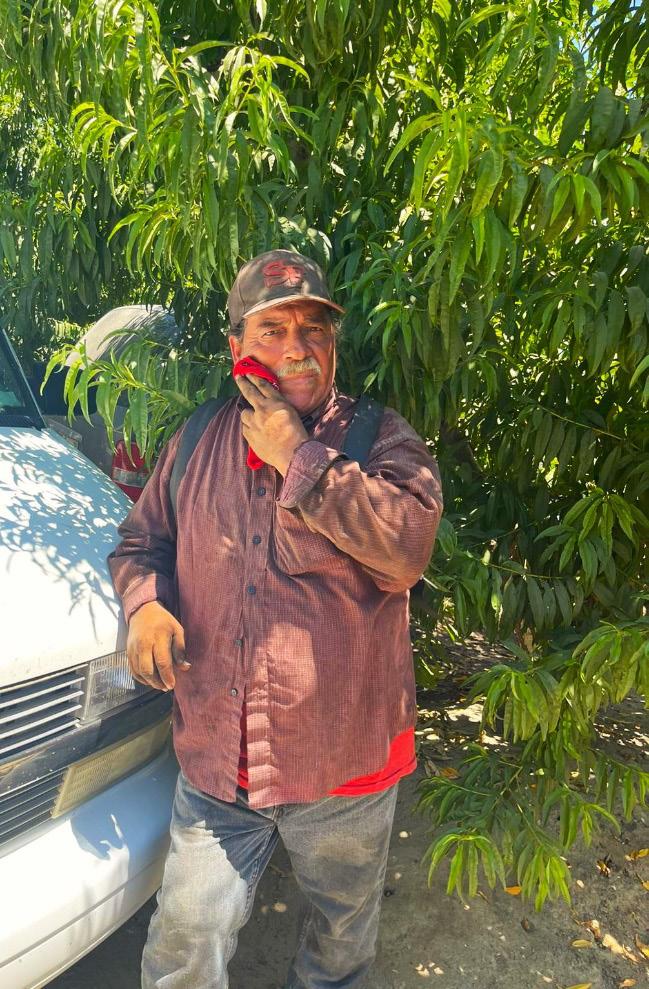
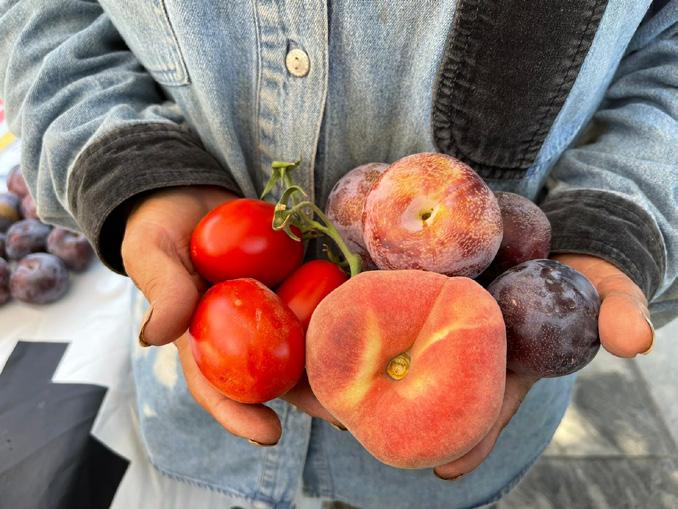
In July and October 2022, Diana Tellefson Torres, Chief Executive Officer, and farm workers met with Secretary of Labor Marty Walsh in Georgia and D.C. respectively to discuss the H-2A abuses in Georgia.
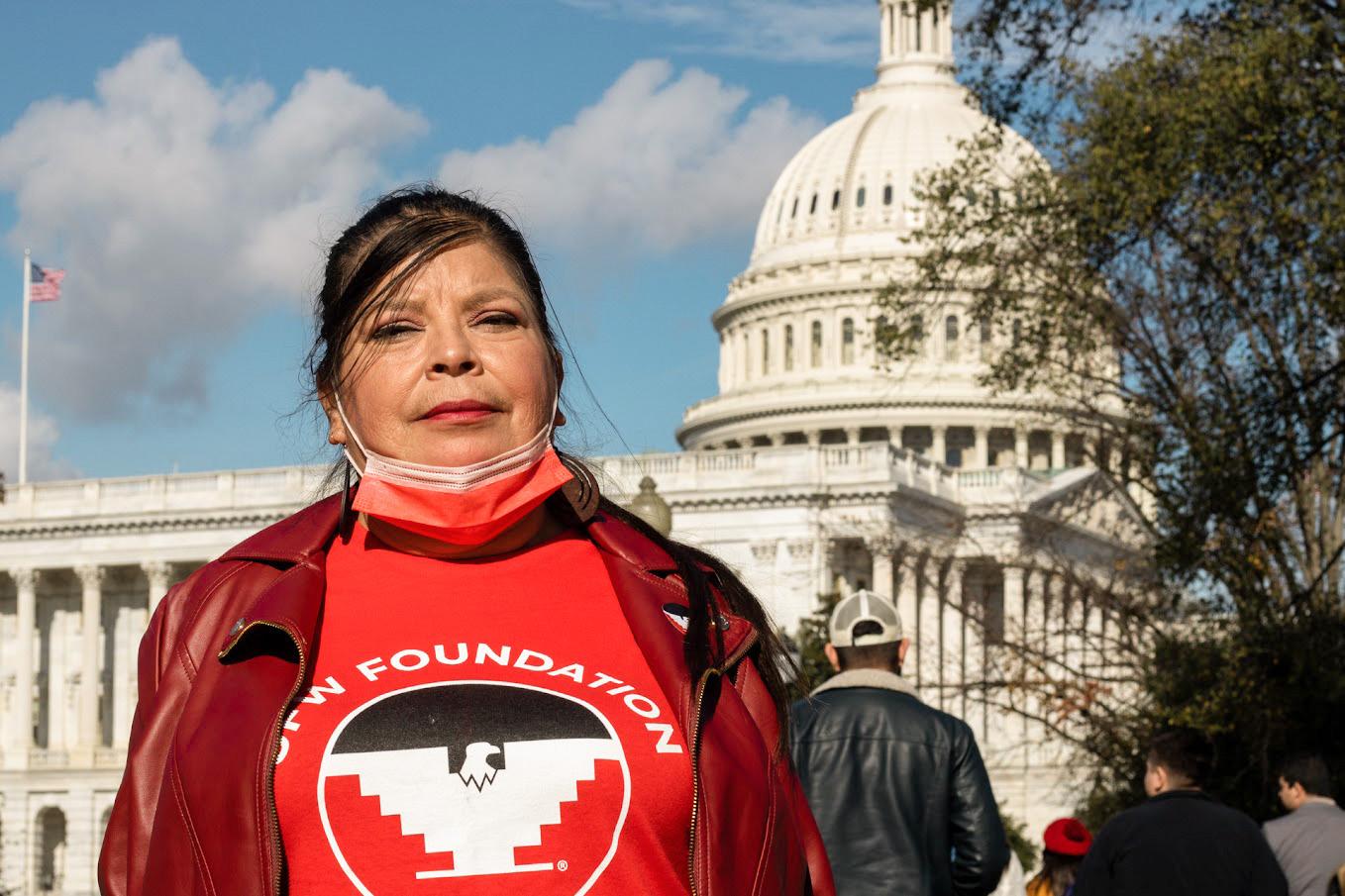 Esther, Farm Worker Leader
Esther, Farm Worker Leader
In November 2022, Esther joined a UFW Foundation farm worker delegation to travel to Washington, D.C. to inform legislators about and encourage them to pass the Farm Worker Modernization Act (FWMA). She also participated in a December 10th advocacy trip to D.C. where she had the opportunity to meet with Labor Secretary Walsh.
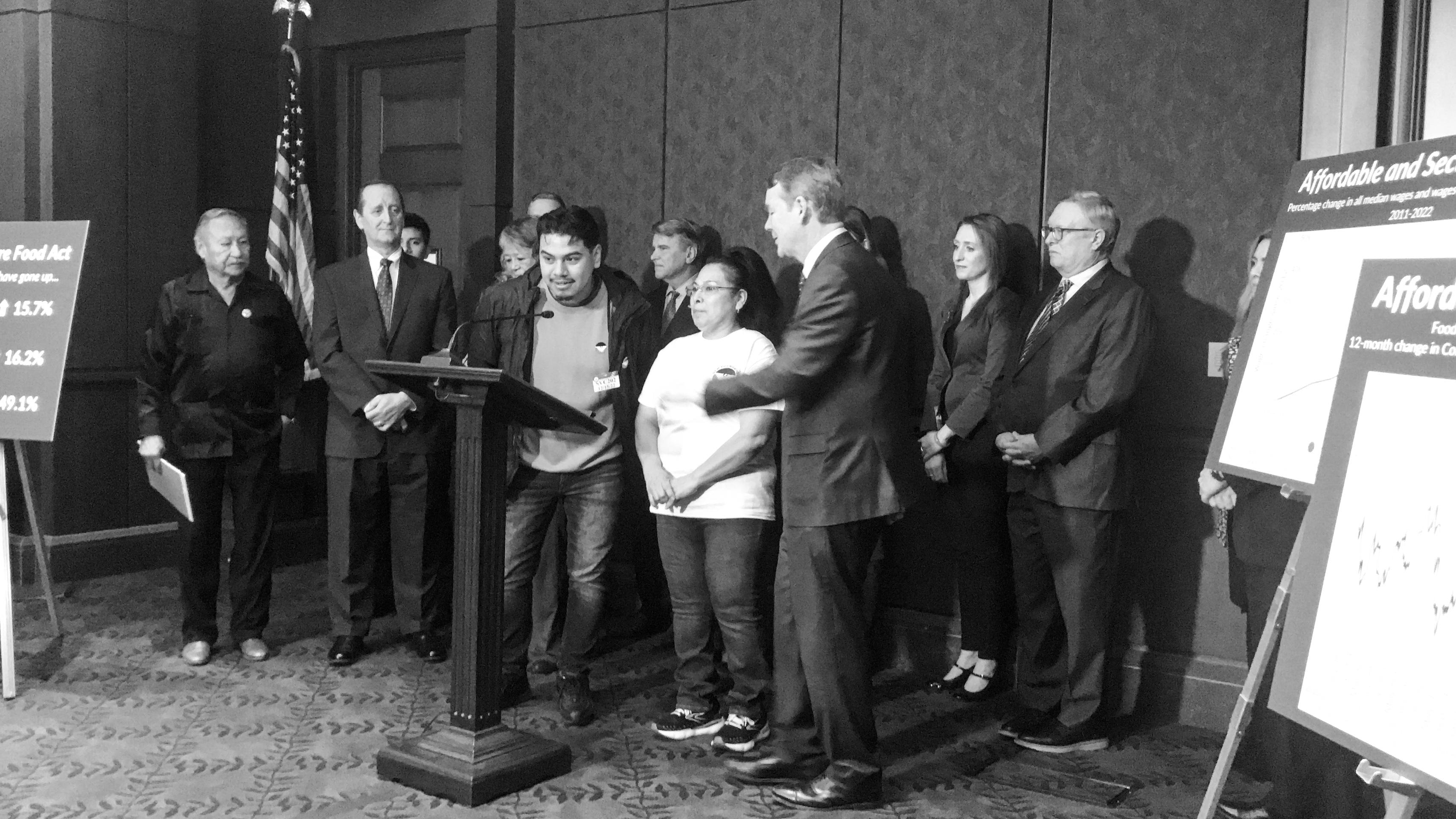

Esther has contributed extensively about her experiences as a displaced domestic worker who has lost her job to H-2A workers and struggles to find steady employment despite her many years of experience. Esther does not blame H-2A workers for her struggles, but rather acknowledges the poor living and working conditions that H-2A workers face—oftentimes worse conditions than domestic workers —and recognizes that the two groups are often pitted against one another. She advocates for all farm workers, H-2A and domestic, and has informed the Department of Labor (DOL) that
more attention needs to be placed on the H-2A program and the companies who hire H-2A labor.
Esther is an excellent example of Cesar Chavez’s deep belief that all farm workers are organizers. She has become a central voice in discussions between the UFW Foundation, elected officials, and government departments regarding the H-2A program and the displacement of domestic workers in Yuma, Arizona. Esther never fathomed that she would tour the White House or that a powerful person like the Secretary of Labor would want to listen to and consider what she had to share.
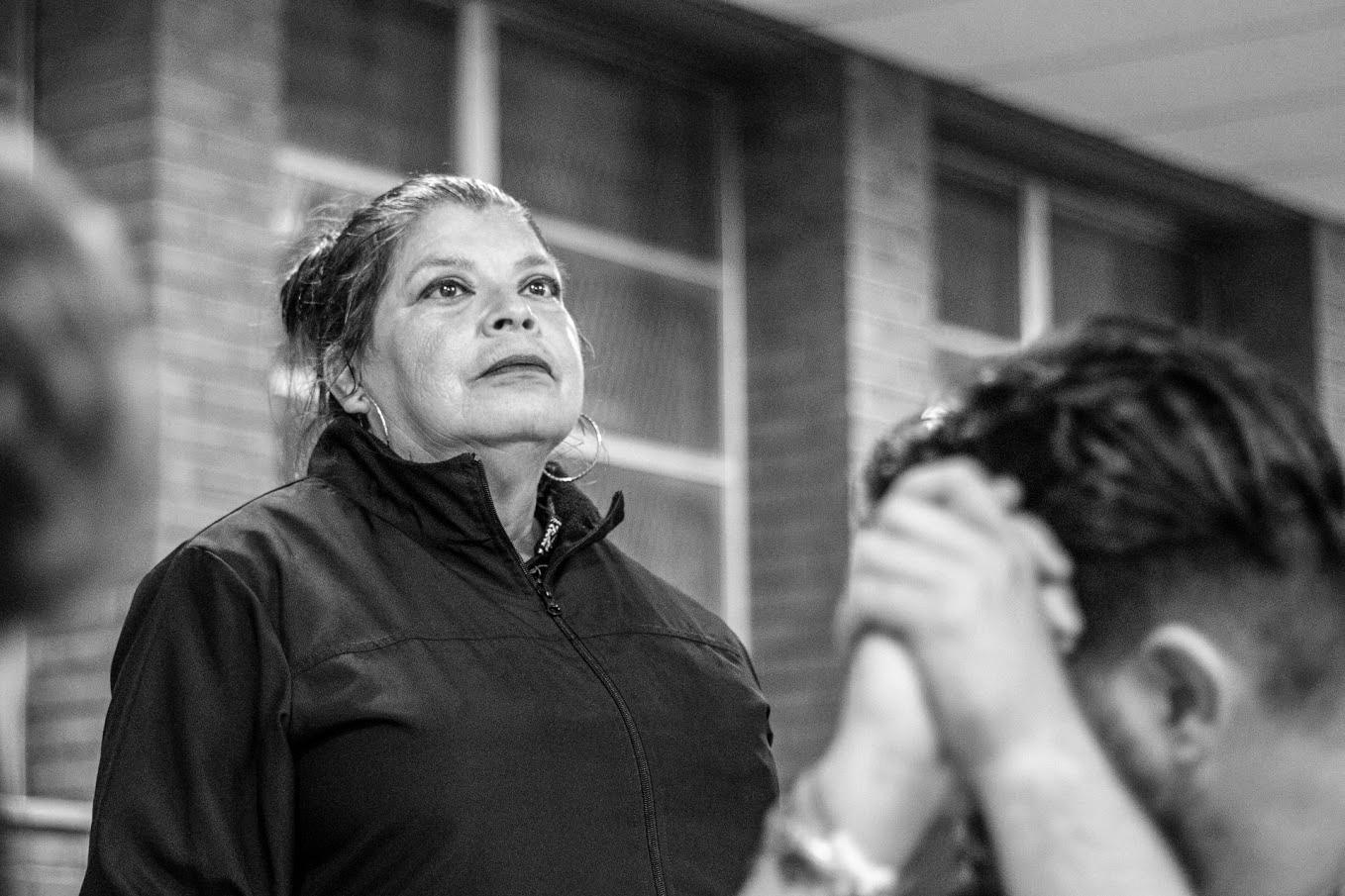
Esther is a farm worker leader with over 27 years of farm work experience.
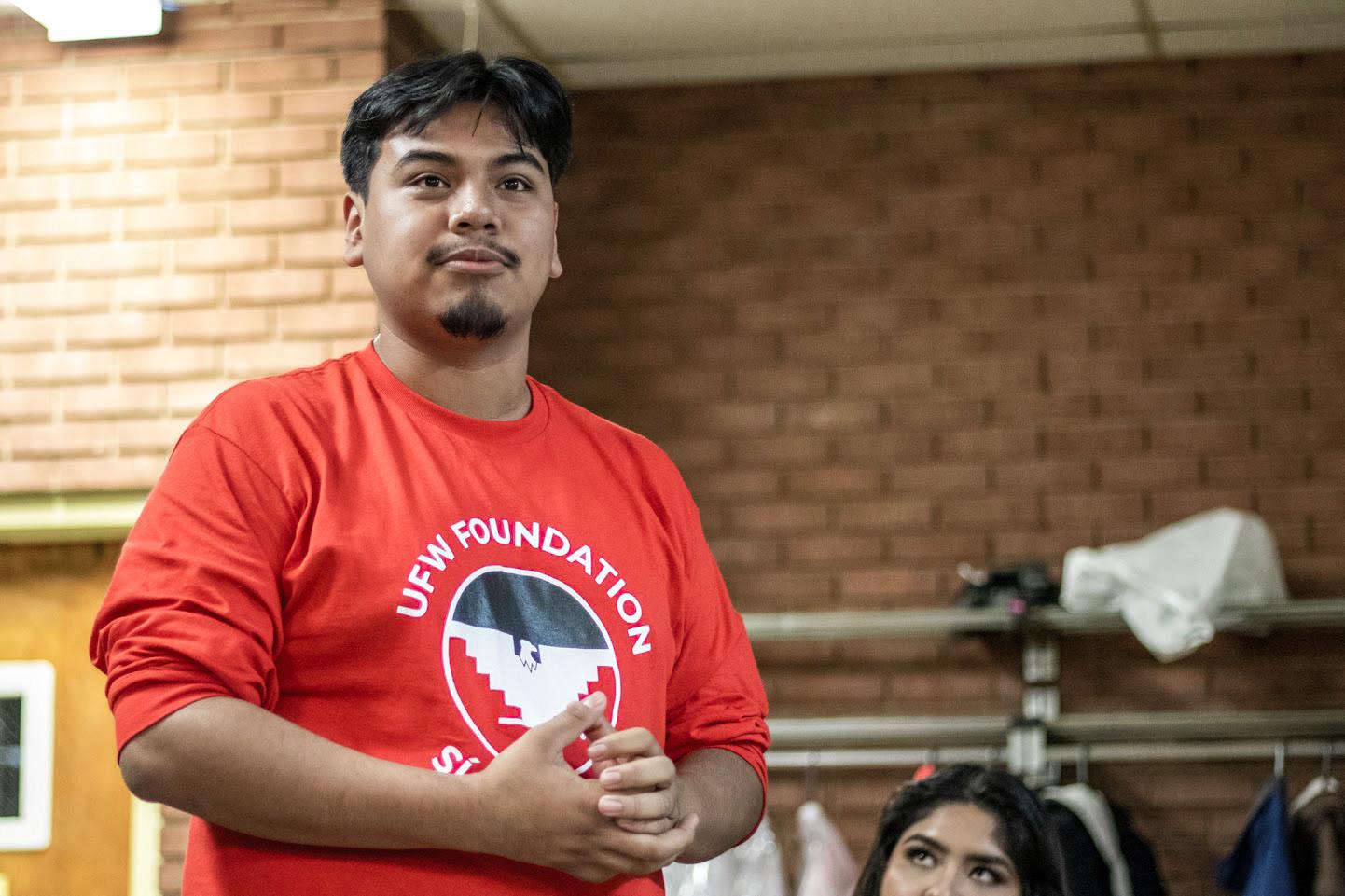

 Spotlighted Image: Farm worker leaders, Bryan and Maricela, give testimony at press conference in Washington, DC.
Bryan, Student Volunteer
Spotlighted Image: Farm worker leaders, Bryan and Maricela, give testimony at press conference in Washington, DC.
Bryan, Student Volunteer
“My mother, who is a farm worker, and is undocumented, joined me on the November 2022 trip to D.C. She felt very empowered. She has witnessed some of the cruelest things and simply cannot understand the anger around the idea of legalization for those who work the hardest, for so long, and under some of the toughest conditions to bring food to the nation’s tables. We are part of the community and this country.

The thing that strikes me every day is that in five minutes my life could be totally changed and my future uncertain. If my mother is picked up, I am the only one left to take care of my sister and myself. I would have to work—to support my sister and help my mother legally—and could not go to school. This is always on my mind.
I traveled to D.C. on both the November and December trips. I had the opportunity to meet and connect with so many other farm workers and other kids of farm workers, students, and staff. It felt so good to make this connection and speak with others who understood clearly what living like this is like. I felt intimidated at first—about meeting with representatives and
senators—but then I thought ‘I can speak English and I am in school and I have the privilege and must speak for others.
The December 10th delegation trip really felt like we had to ‘make it or break it.’ We had the opportunity to meet with so many more representatives than before. Everyone worked very hard and we got to hear so many powerful stories. Each meeting we had gave us the sense that support for the legislation and its aims were getting stronger and stronger. We did not get it passed this session, but not one of us is giving up. We got so close and will simply keep going.
So many other students at my college come from similar backgrounds. I would like my presence there to build energy. I would like for my college to become a beacon to raise awareness around advocacy for farm workers and all our rights.”

The thing that strikes me every day is that in five minutes my life could be totally changed and my future uncertain.
BRYAN, STUDENT VOLUNTEER
EXPANDED REGIONALLY & NATIONALLY
We expanded regionally and nationally to advocate, empower, and serve farm worker and low-income immigrant populations.
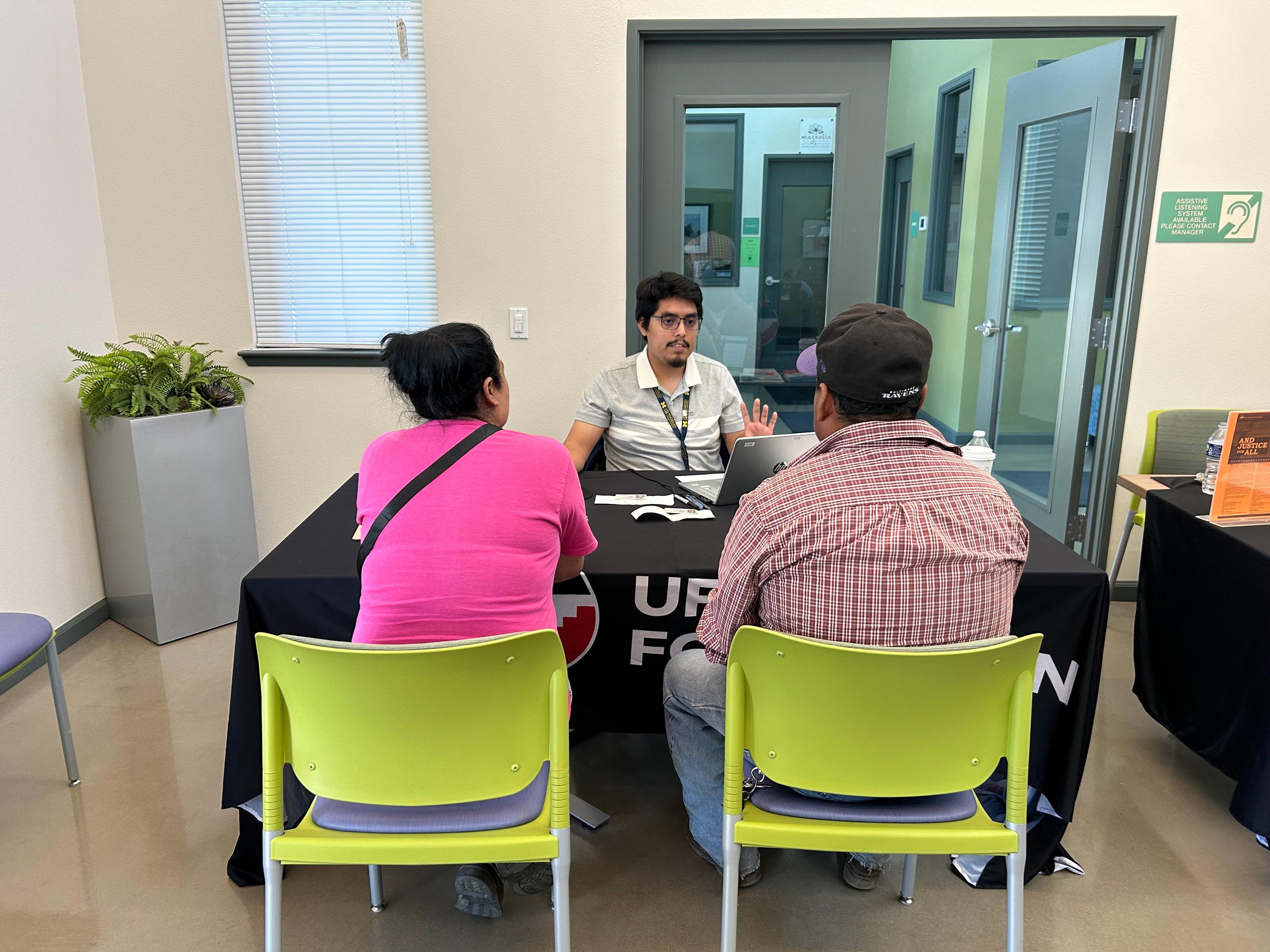

Our Research department launched in 2020 and is generating data and analysis that is:
Informing farm worker practices and policies in the context of climate change.
Building partnerships with academia and other non-governmental organizations to advance just and equitable solutions and innovations related to farm workers.


Documenting and mapping our reach and impact.
Conducting a range of farm worker surveys to inform the public and shape policy, practice, and implementation
In December 2020, a total of 14,653 self-identified agricultural workers responded to a UFW Foundation text message survey assessing the vulnerability of farm workers during the pandemic. The anecdotal knowledge that we have had about the severe lack of health insurance in the farm worker community was confirmed as 78% of respondents responded that they had no health insurance; when the data was disaggregated, it showed that 91% of Washington respondents had no health insurance. In fact, 13% of all respondents had never had a health check-up. This and other survey data supported the UFW Foundation’s successful advocacy to prioritize farm workers for COVID-19 vaccination. Above is a density map that shows the zip codes of health survey respondents.
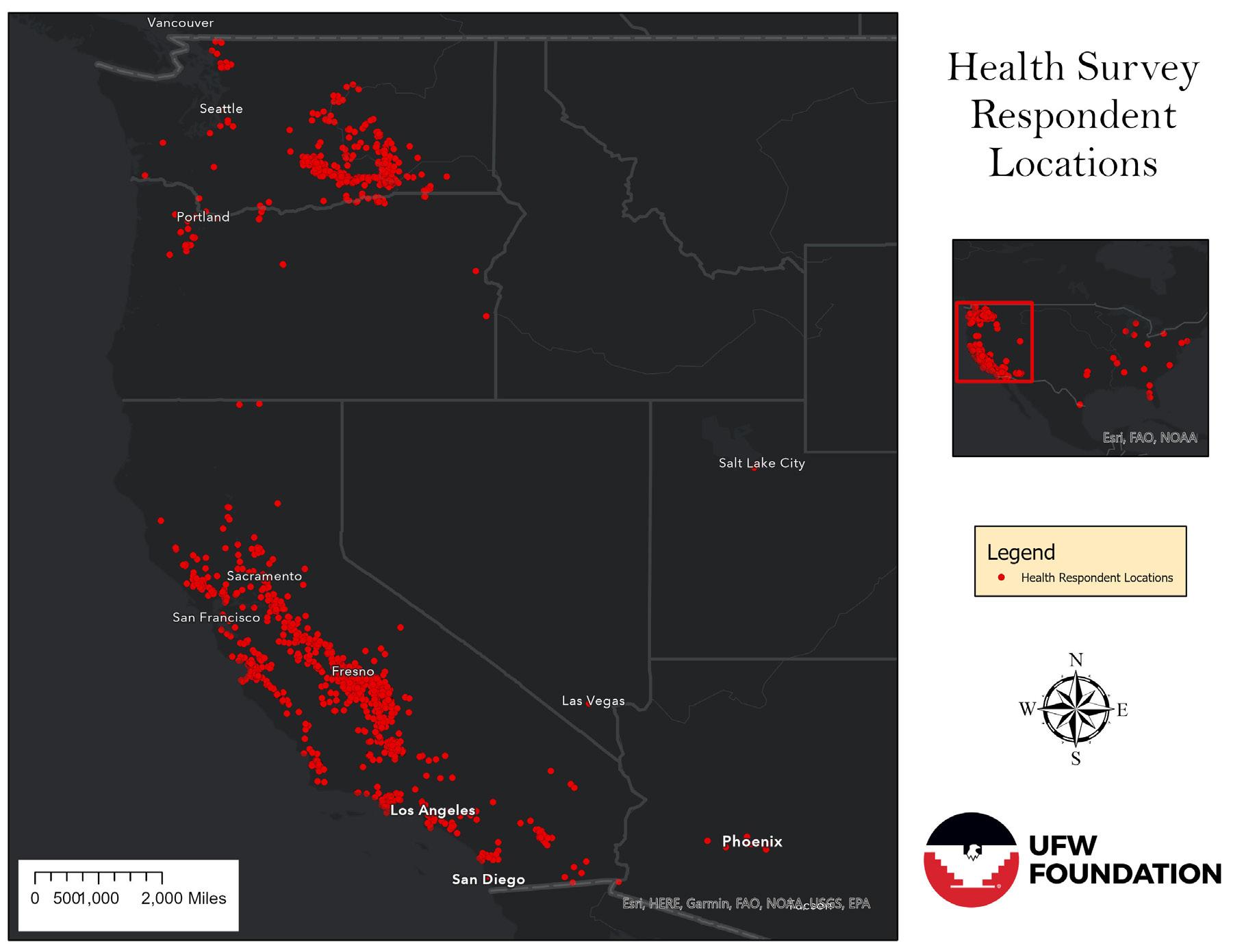


 Diana Tellefson Torres, Chief Executive Officer, talking to farm workers in Georgia fields.
Diana Tellefson Torres, Chief Executive Officer, talking to farm workers in Georgia fields.
The Farm Worker Technology Initiative aims to improve and scale access to services while empowering farm workers with greater autonomy through a tool that is informed directly by their needs. Doing so will also allow us to address an ongoing challenge faced by many nonprofits: limited access to resources to meet high demand. Additionally, technological advances can allow us to empower farm workers who have been historically excluded from progressing from these developments.
Increase access to important information and resources.
Increase access to and utilization of critical services.
Provide a platform for learning and skill building.
Provide a dedicated and safe space for engaging in advocacy.
(Using anonymized data, space for accurate information, informed and equitable dialogue)
Provide a space for public education and movement building.
+50,000 Farm Workers Connected With Needed Assistance
Built and released our first digital application at the start of the COVID-19 pandemic that allowed us to determine Emergency Relief needs among farm workers and register and connect over 50,000 farm workers with needed assistance via 484 on-the-ground events.
This further allowed us to gain greater insight into how farm workers utilize their smartphones and build digital trust between our staff and farm workers.
Built and released the Alivio desktop application to process $78 million in USDA Farm and Food Worker Relief payments for those negatively impacted by the pandemic.
UFW Foundation is actively involved in addressing climate change and its impact upon farm workers. We are researching and sharing information through various media and means to advocate for policies and practices that protect and preserve:
Farm workers and their communities. The natural environment that produces our agricultural goods.
Farm workers’ ability to safely and securely work.
Learn more about our Climate Change efforts featured in The Human Impact of Climate Change: A Case Study underwritten by Unbound Philanthropies and The Solutions Project:
Chris Hayes opined that farm workers should be prioritized for vaccination and featured the Bakersfield Californian’s article that headlined the UFW Foundation’s call for prioritization.

https://youtu.be/hfchPwv6fbo
UPLIFTED FARM WORKERS IN THE MEDIA
From 2020-2022, the UFW Foundation garnered over including coverage in Mother Jones, LA Times, USA Today, US News and World Report, Al Jazeera, Rolling Stone Magazine, and many other publications.

463 media hits

